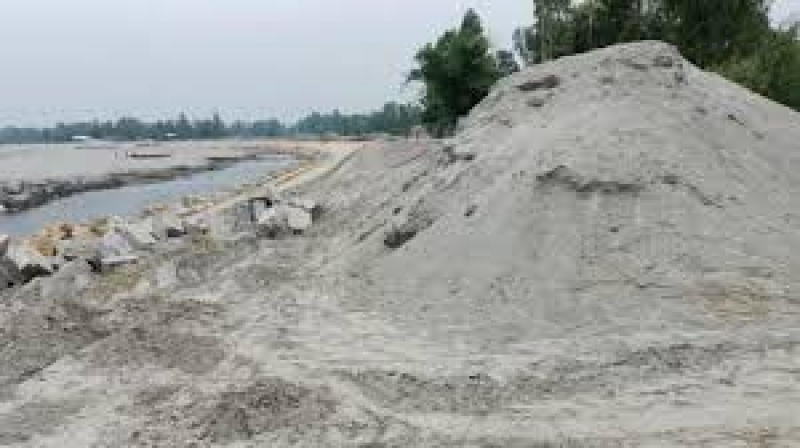- FFD4 Must Deliver for the World’s Most Vulnerable Nations |
- Observe July Uprising Annually to Guard Against Autocracy |
- Human Rights a Key Driver of Climate Change Progress |
- Security measures at Shahjalal Airport enhanced |
- Polls in early next year: Prof Yunus tells Marco Rubio |
Illegal Teesta sand use sparks outrage in Lalmonirhat

An illegal road project cutting through fertile farmland in Kaliganj upazila of Lalmonirhat district is drawing sharp criticism, as sand dredged unlawfully from the Teesta River is being used for its construction.
The construction, carried out with high-powered dredgers locally known as ‘bomb machines’, has triggered concerns over environmental degradation, infrastructure damage and the threat of large-scale erosion.
Despite repeated complaints from local residents, the activity continues unabated, allegedly backed by a politically connected syndicate.
The project not only violates environmental regulations but is also viewed as a direct threat to public resources and livelihoods.
A road built on sand literally
The road, currently under construction through cropland in the Munshir Bazar area of Tushbhandar Union, is being built entirely with sand illegally extracted from the Teesta River.
Locals report that the builders are presenting the project as a "voluntary community initiative" to avoid legal scrutiny. But, many believe the primary motive is to ease sand transportation for commercial purposes.
Witnesses confirm that several dredging machines operate around the clock, disrupting the river’s natural flow.
Locals warn that the river is already shifting course, putting hundreds of acres of farmland at immediate risk.
“Sand traders are building this road by destroying our farmland and threatening our future,” said Saiful Islam, a 70-year-old resident. “They’re using muscle power while the administration looks the other way.”
Legacy infrastructure at risk
The illegal road runs parallel to a government-built road and bridge constructed over a decade ago as part of a Tk 30 lakh project by the Ministry of Disaster Management and Relief.
Originally intended to serve a cluster village (Guchhogram) for landless families, the road and bridge have remained crucial transport links between Kaliganj upazila and neighbouring Gangachara upazila in Rangpur district, even after the original settlement was swallowed by the river.
Over the years, the government has invested millions of taka in repairs to support local transport and agriculture. That legacy is now under threat.
Heavy sand trucks have already caused severe damage to the government road, leaving it riddled with potholes and virtually unusable during the monsoon.
In protest, locals recently imposed a ban on truck movement. In retaliation, the syndicate reportedly began building the new road across cultivable land. “If this continues, the government-built bridge will become useless, and our fields will flood due to blocked drainage,” warned a local resident.
Syndicate operating with impunity
Locals allege that the sand extraction and illegal construction are being carried out by a syndicate previously backed by former Social Welfare Minister Nuruzzaman Ahmed during the Awami League tenure.
Though he no longer holds office, his former associates are reportedly continuing operations without consequence. “The government road has been destroyed for their benefit, and now they’re taking our farmland too,” said KM Ar Shahin, a local community leader.
Frustrated by the lack of action, residents have organised several human chains and submitted written complaints to the local administration.
Authorities acknowledge the issue
Kaliganj Upazila Nirbahi Officer (UNO) Zakia Sultana told UNB that the administration is aware of the situation and maintains a zero-tolerance policy towards illegal sand extraction.
“Whenever we receive reports, we conduct mobile court drives. But the sand traders often flee before we arrive. There is absolutely no permission for building a new road over arable land,” she said.
The UNO confirmed the receipt of a written complaint and assured that there will be a formal investigation into the matter, reports UNB.

